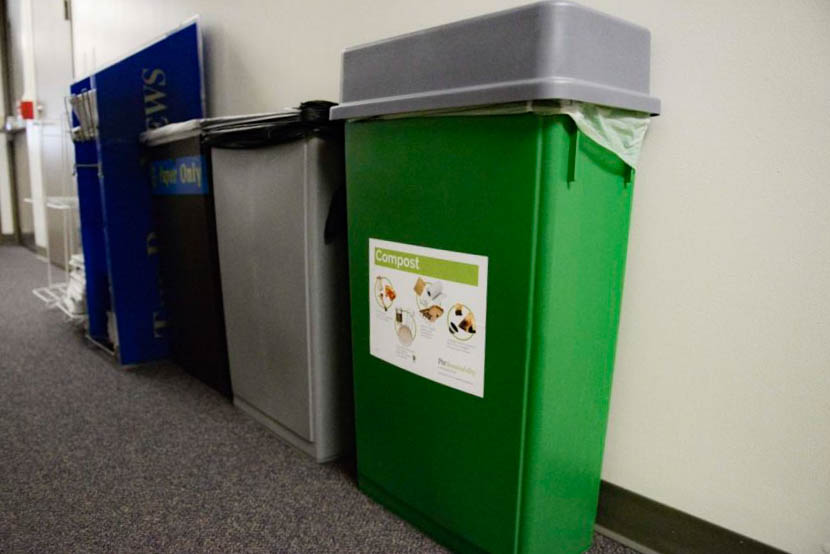The Green Space | Eco-conscious living on campus
The Green Space is a biweekly blog about all things environmental — whether we’re talking a mason-jar compost heap or the entire world.
Knox Coulter | Senior Staff Photographer
Recycling and composting help to divert waste from landfills.
August 20, 2020
As students move in, shelter-in-place and settle into their pods, life on campus will soon resume — even if it is a much-abbreviated version — giving us all a chance to establish some shiny new habits. While those habits should of course include adherence to public health guidelines — wearing masks, washing hands, social distancing, etc. — I would like to propose that you can also incorporate practices into your daily life that will reduce your carbon footprint and allow you to live more sustainably. To help you toward this goal, here are some tips for living greener, even if you’re trapped in a 17-foot-by-11-foot dorm room.
Reduce, reuse, recycle
Pitt has single stream recycling, which makes it awfully easy to recycle because you don’t even have to sort your recyclables. In the dorms, you should be able to find a recycling bin on every floor — if your floor doesn’t have one, you can contact Panther Central and they’ll sort it out. The University recycles paper (including your copy of The Pitt News, available at newsstands around campus), cardboard, metals, plastics (bottles, jars and jugs with no lids), glass, books and clear cold coffee cups. For other recyclable materials, such as textiles and batteries, the University has more specific rules.
You can similarly reduce your waste by bringing along reusable containers and cutlery. You’ll likely be eating in your room a good bit, so even one plate, one bowl and a few utensils can save you a lot of plastic forks and paper plates. Reusable water bottles can also be very useful and convenient — there are water bottle filling stations in every dorm and almost every building around campus.
Compost your food waste
Pitt’s current goal is to divert 50% of food waste to compost by 2025 — and you can help with that! Composting creates nutrient-rich soil that can then be used to grow food or other plants, keeping organic waste out of the landfill where it would release methane, the second-most potent greenhouse gas after carbon dioxide. Composting is just as easy as recycling, although only specific buildings have receptacles for compost. Acceptable materials for composting include food waste of any kind, pizza boxes, coffee grounds, paper towels, napkins, tissues and shredded newspaper.
Look for ways to conserve energy
As of now, electricity generation accounts for about half of the University’s greenhouse gas emissions, although Pitt is currently looking to reduce that amount by switching to alternative energy sources such as solar panels and hydropower. In the meantime, you can do your part by looking for small ways to conserve energy. Perhaps take the stairs instead of the elevator sometimes, or hang your laundry on a drying rack instead of using a dryer, or unplug your chargers when you’re not using them. Small actions like these, when repeated, can have a big impact.
Be a conscious consumer
It can be easy to turn to Amazon for every need, but the production and shipping of Amazon’s goods is often not the most energy-efficient (or ethically sound). Instead, consider shopping locally — it may be a bit more expensive and less convenient, but you will be supporting Pittsburgh’s lovely small businesses and cutting down on shipping emissions. Of course, be careful if you plan to go out on the town and shop around — wear a mask, maintain social distancing and wash or sanitize your hands frequently. If possible, take advantage of curbside pickup programs.
Not only should you consider where you’re buying, but also what you’re buying. Fast fashion chains like Urban Outfitters and Shein have recently come under scrutiny for their cheaply produced clothing, made mostly of polyester, a material that accounted for the release of 1.5 trillion pounds of greenhouse gases in 2015. These clothes are not made to last and will likely begin falling apart after a few months of wear, meaning that they will shortly end up in a landfill, producing even more greenhouse gases as they decompose. Instead of supporting fast fashion companies, consider purchasing clothing from our very own student-run University of Thriftsburgh — whenever it reopens — or other thrift stores in the area. In general, the rule of thumb when shopping, even at thrift stores, is to buy less so that you create less waste in the end. Plus, you’ll save money!
Stay informed
I know it can be tempting to shut out all mention of environmental issues because the problems just seem so overwhelming, but just because you’re not paying attention to them doesn’t mean that they’ve disappeared. Our generation must reckon with climate change — this is an unavoidable fact. The only way to move forward is to stay informed so that we can modify our own actions and lobby for more sweeping changes from the top down. Keeping yourself in the loop doesn’t have to be difficult — all that’s needed is an article here or there, a podcast perhaps, maybe even a book if you want to look a little deeper.
Change is only possible with collective action, so be sure to share what you learn. The coronavirus crisis and the environmental crisis are somewhat similar in that way: if we all work together — if we care for each other and the planet — we can and will make it through this.








